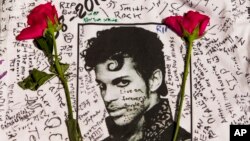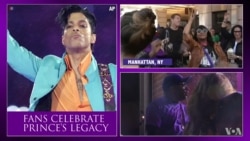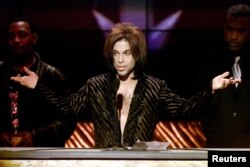On his debut album For You released in 1978, when he was 19, it's clear that Prince Rogers Nelson was pushing boundaries.
The song "Soft and Wet," the third track on the album, is downright raunchy, so full of double entendre and straight up sexuality it makes some of today's bubble gum love songs seem laughably tame.
And that was his debut - 33 minutes of pure, R&B and funk. Cue up that first record and take a listen to the lounge groove of "Crazy You" and the funk perfection of "My Love is Forever," with its understated feedback-sustained guitar solos.
That first release showed the world a musician who was not only a virtuoso, but also determined to defy classification and experiment with musical genres.
"When I first started out in the music industry, I was most concerned with freedom," he told the audience in 2004 when he was inducted into the Rock and Roll Hall of Fame.
WATCH: Fans pay tribute to Prince
Freedom in music, life
That freedom was also evident in what seemed to be Prince's fluid sexuality, that, like his music, knew no borders.
He wasn't the first artist to push the boundaries of sexuality.
The flamboyant Little Richard was one of the first rock and rollers to do so.
The piano man who sometimes referred to himself as "A Georgia Peach" wore bright pink and red and coiffed his hair to perfection.
And then there was David Bowie, who passed away in January.
Bowie was the gender neutral Ziggy Stardust persona of the 1970's, his makeup and clothes owing more to music group Abba than to Don Draper, the fictional character in the critically acclaimed U.S. television series Mad Men.
And in the 80s, Bowie was the Thin White Duke, a dapper James Bond wanna-be in a white tux and perfect hair.
Prince, who at times seemed like a perfect mash up of Little Richard and Jimi Hendrix, not only refused to be classified but poked fun at those who bothered to wonder about his private life.
"Am I straight or am I gay?" he famously asked in his 1981 hit "Controversy". The record cover is the first where he appears in his signature purple, with various newspaper headlines behind him.
Beyond classification
It's the headlines that catch the eye. "Love they neighbor" reads one. "President Signs Gun Control Act" reads another. A wish list maybe? Hopes and dreams? Who knows, and that's the fun of it all.
It's in Controversy that we get a clear picture of what Prince might really want from the world.
"Sexuality," the second track on the album, isn't overtly sexual at all. Rather it seems hopeful, and Prince seamlessly combines the revellatory language of religion with the concept of sexual freedom.
"We don't need no segregation, we don't need no race, New Age revelation; I think we got a case." Prince sings, "Sexuality is all you'll ever need; sexuality, let your body be free."
All of this came before the success of 1999 and Purple Rain, the two-album stretch in the mid-80's when Prince simply overwhelmed the world of popular music.
The diminutive star (he stood at 1.6 meters) didn't speak to the press much; the world is left with his music as his primary legacy.
And it was his ability to play that overwhelms the senses of anyone inclined to spend too much time wondering about his private life.
There's his now famous "While My Guitar Gently Weeps" guitar solo that dropped jaws in Cleveland during a tribute to ex-Beatle George Harrison at the Rock and Roll Hall of Fame in 2004.
And then there's the 2007 Super Bowl halftime show when he stormed through "Let's Go Crazy," Tina Turner's "Rolling on The River'"and even gave the Foo Fighter's "Best of You" a Prince one-over.
It was arguably one of the few times when the audience was sad to see the players return to the field.
Prince was that good.
And so ultimately it's impossible to give his legacy the homage it deserves.
He released more than 30 albums, each one experimental and challenging in its own way.
On his last, HITnRUN Phase Two, things are no different; his work reflects his life.
In "Baltimore," he sings, "Does anybody hear us pray, For Michael Brown or Freddie Gray? Peace is more than the absence of war."
It was Prince at his best, challenging, feeling deeply, not caring what fans and detractors thought, but challenging them to do just that.
Storify: How celebrities, fans reacted to news of Prince's death








